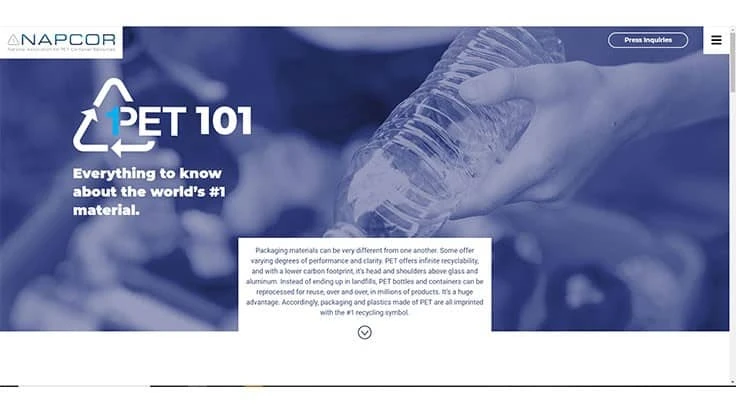
NAPCOR
Plastics have been the object of public scorn recently. Take the Planet or Plastic? campaign that National Geographic launched in May 2018. This multiyear effort is designed to raise public awareness about the global plastic trash crisis and encourage reducing the use of single-use plastics.
The polyethylene terephthalate (PET) container industry is responding to this situation with a campaign that seeks to differentiate PET containers from other plastics.
NAPCOR (National Association for PET Container Resources), Charlotte, North Carolina, launched Positively PET, a campaign that has been in the planning stages for approximately a year and a half, earlier this year. Through the campaign, the trade association, which is comprised of companies operating in the United States, Canada or Mexico that manufacture PET resin or packaging or provide products or services to the PET industry, hopes to highlight the benefits of PET, including its recyclability.
Laura Stewart, NAPCOR communications director, says the three-year campaign’s social media focus began in Charlotte and in St. Paul, Minnesota and runs through April. It incorporates paid social media, a microsite at https://positivelypet.org that offers information about PET and PET recycling and news media outreach.
Darrel Collier, NAPCOR executive director, says the organization has identified Dallas and Nashville, Tennessee, as the next targets for the social media campaign. He says NAPCOR is working with the American Beverage Association and its Every Bottle Back initiative in the Dallas area to reinforce its messaging around PET bottle recycling.
Stewart says these combined efforts will amplify the message that PET bottles can and should be recycled and give the PET industry a voice.
Collier says engagement with the social media messaging and the microsite will be measured to gauge the effectiveness of the program.
In a world where many consumers are focused on the ocean plastics issue, NAPCOR is trying to stress the environmental benefits of plastic packaging. Through Positively PET, the association seeks to inform the public that the alternatives to plastic packaging may not be better from an environmental perspective and may even be more harmful, Stewart says.
For example, the site states, “Beverage containers made from PET have a lower carbon footprint than their aluminum counterparts when you compare the whole life cycle of the product (i.e., making, transporting, using the product). The carbon footprint of a beverage container made with recycled PET can be 15 percent to 50 percent lower than its aluminum counterpart.” The more recycled content that is used, the lower the carbon footprint, according to the site.
Collier adds, “It’s a hard message, but it needs to be out there. We hope it will register with consumers.”
The microsite also attempts to debunk myths that surround PET bottles, such as using one contributes to ocean debris. The site says, “When you choose to recycle your PET bottle, you’re helping our planet. If you recycle right—in the recycling bin—your PET bottle can be recycled over and over again.”
Stewart says that through the campaign, NAPCOR also is seeking to reassure consumers that their PET bottles and jars are getting recycled, so they continue to have confidence in the U.S. recycling system.
“A lot of times, PET gets lumped into the 8 or 9 percent of plastics that get recycled,” Stewart says, “while the U.S. recycling rate for PET is around 30 percent. Globally, 54 percent is recovered. There is greater opportunity for PET to grow, but we don’t want it to be grouped in with the 9 percent.”
To that end, Positively PET seeks to educate consumers on how to properly recycle PET bottles. A video that addresses this topic will be released as part of the campaign.
Latest from Recycling Today
- Aqua Metals secures $1.5M loan, reports operational strides
- AF&PA urges veto of NY bill
- Aluminum Association includes recycling among 2025 policy priorities
- AISI applauds waterways spending bill
- Lux Research questions hydrogen’s transportation role
- Sonoco selling thermoformed, flexible packaging business to Toppan for $1.8B
- ReMA offers Superfund informational reports
- Hyster-Yale commits to US production





